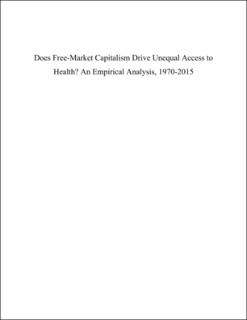Does free-market capitalism drive unequal access to health? An empirical analysis, 1970–2015
Peer reviewed, Journal article
Accepted version
Permanent lenke
https://hdl.handle.net/11250/2731244Utgivelsesdato
2020Metadata
Vis full innførselSamlinger
Originalversjon
10.1080/17441692.2020.1849350Sammendrag
Many scholars, particularly in public health, argue that neoliberal capitalist economic forces adversely affect communities by increasing inequalities, ultimately affecting health. Apparently, corporate capitalism affects health and communitarian concerns because governments place corporate profits over the publićs interests. Using unique data collected by the Varieties of Democracy (VDEM) project that capture the degree of access of the poorest segments of society to health services comparable with those available to the richest segments, this study finds that an index of economic freedom robustly reduces inequality of access to health. We argue that these results obtain because greater exposure to global markets increases the premium on the productivity of labour, increasing incentives for political elites to invest in productivity-enhancing public goods. Our results are robust to a number of alternative models and data, and robust to instrumental variables analyses addressing potential endogeneity. Rather than free-market capitalism increasing health-related neglect of society, our data suggest that free-market capitalist conditions promote equitable access to health. This is good news for governments wishing to grow their economies, reform broken health systems for gaining advantages in a competitive global economy, and serve communitarian interests, such as shared good health.
